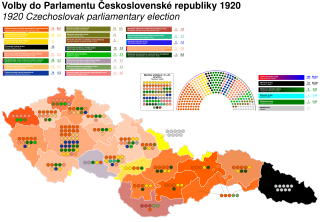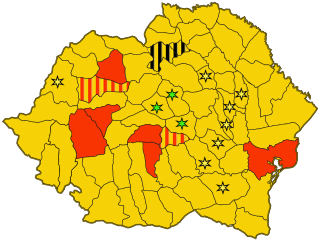Parliamentary elections were held in Greece on 25 September 1932. All 250 seats in the Lower House of the Greek Parliament, the Chamber of Deputies, were elected, as well as one-third of the seats in the Senate. The outcome was an ambivalent result for the two biggest parties, the Liberal Party of Eleftherios Venizelos and the People's Party. The People's Party received a plurality of votes in the Chamber of Deputies elections, but won fewer seats than the Liberal Party. The Liberals also won the most seats in the Senate.
General elections were held in Luxembourg on 30 May 1954. The Christian Social People's Party won 26 of the 52 seats in the Chamber of Deputies.

General elections were held in Romania in December 1937. The Chamber of Deputies was elected on 20 December, whilst the Senate was elected in three stages on 22, 28 and 30 December. Voting was by universal male suffrage, making them the last elections held before women could vote.

Parliamentary elections were held in Czechoslovakia on 18 and 25 April 1920. Members of the Chamber of Deputies were elected on 18 April and members of the Senate on 25 April. The elections had initially been planned for mid- or late 1919, but had been postponed.

General elections were held in Belgium on 20 November 1921. The result was a victory for the Catholic Party, which won 70 of the 186 seats in the Chamber of Representatives. Voter turnout was 91.1% in the Chamber election and 91.0% in the Senate election.
Partial general elections were held in Luxembourg on 3 June 1934, electing 29 of the 54 seats in the Chamber of Deputies in the south and east of the country. The Party of the Right won 12 of the 29 seats, but saw its total number of seats fall from 26 to 25.

Parliamentary elections were held in Czechoslovakia on 15 November 1925. The result was a victory for the Republican Party of Farmers and Peasants, which won 45 seats in the Chamber of Deputies and 23 seats in the Senate. Voter turnout was 90.1% in the Chamber election and 77.3% for the Senate.

Parliamentary elections were held in Portugal on 13 June 1915. The result was a victory for the Democratic Party, which won 106 of the 163 seats in the Chamber of Deputies and 45 of the 69 seats in the Senate.
General elections were held in Romania between 4 and 8 November 1919. The Romanian National Party, which ran mostly unopposed in Transylvania, emerged as the largest party in Parliament, winning 169 of the 568 seats in the Chamber of Deputies and 76 of the 216 seats in the Senate. Though both the Socialist Party and People's League decided to boycott the elections, several of their candidates who had registered before the decision went on to win seats.
General elections were held in Romania between 25 and 27 May 1920. The result was a victory for the governing People's Party, which won 206 of the 366 seats in the Chamber of Deputies and 124 of the 166 seats in the Senate.
General elections were held in Romania between 1 and 3 March 1922. In the first stage between 1 and 3 March, seats in the Senate were elected. In the second stage between 5 and 7 March the Chamber of Deputies was elected, and in the third and final stage from 9 to 11 March, additional Senate seats were elected. The result was a victory for the governing National Liberal Party, which won 222 of the 372 seats in the Chamber of Deputies and 111 of the 148 seats in the Senate. Both houses were combined to form a Constitutional Assembly, which approved the 1923 constitution.

General elections were held in Romania in May and June 1926. The Chamber of Deputies was elected on 25 May, whilst the Senate was elected in two stages in May and 10 June. The result was a victory for the governing People's Party, which, together with the allied Romanian National Party, Magyar Party and German Party, won 292 of the 387 seats in the Chamber of Deputies and 107 of the 115 seats in the Senate elected through universal male vote. With some exceptions, the Peasants' Party and the main branch of the National Party ran on common lists under the name of National Peasant Bloc.

General elections were held in Romania in July 1927. The Chamber of Deputies was elected on 7 July, whilst the Senate was elected in three stages on 10, 12 and 14 July. The result was a victory for the governing National Liberal Party (PNL), which won 318 of the 387 seats in the Chamber of Deputies and 92 of the 110 seats in the Senate elected through universal male vote.
General elections were held in Romania in June 1931. The Chamber of Deputies was elected on 1 June, whilst the Senate was elected in three stages on 4, 6 and 8 June. The result was a victory for the governing National Union, an alliance of the National Party, the National Liberal Party, the German Party, the Agrarian Union Party, the Vlad Ţepeş League, the Agrarian League and several other parties. The Union won 289 of the 387 seats in the Chamber of Deputies and 108 of the 113 seats in the Senate elected through universal vote. The five seats won by the Communist-dominated Peasant Workers' Bloc were ultimately invalidated by the new Parliament.
General elections were held in Romania in July 1932. The Chamber of Deputies was elected on 17 July, whilst the Senate was elected in three stages on 20, 24 and 26 July. The result was a victory for the governing National Peasants' Party-German Party alliance, which won 274 of the 387 seats in the Chamber of Deputies and 104 of the 113 seats in the Senate elected through universal male vote. Of the 274 Chamber seats, 265 were taken by the National Peasant's Party and nine by the German Party.
General elections were held in Romania in June 1939. The Chamber of Deputies was elected on 1 June, and the Senate on the following day. They were the first elections since the introduction of the royal dictatorship of King Carol II under the 1938 constitution. Voters were presented with a single list from the National Renaissance Front, which had been the only legally permitted party in Romania since December.
The Group of Transylvanian Saxons was a political party active in interwar Romania representing the minority rights of the Transylvanian Saxons, a sub-group of the ethnic German community in Romania who have been living in Transylvania since the High Middle Ages.
The Peasants' Party–Lupu was a political party in Romania.
The Agrarian Union Party was a political party in Romania.
Parliamentary elections were held in Portugal on 22 March 1840.












